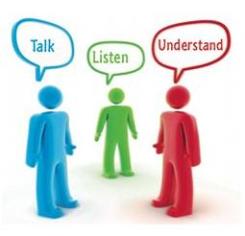The communication evaluations this week helped me to gain a better understanding of not only, how I see myself as an active conversationalist but also, how my family and professional colleagues view me as a communicator. The participants that completed the surveys had similar responses, placing me at the same level in both inventories and in the same Listening Styles Profile, as a people oriented listener. I was surprised to learn that others viewed me as an active and empathetic listener, in the past I was often accused as being too aggressive and non-caring. This can be seen as both a strength and weakness in effective communication because, it can lead me to think more with my feelings rather than anything else, being attentive to the needs of others, and often overlooking personal needs.
I also wasn’t too surprised when my verbal aggressiveness scale placed me at a moderate level on all four results. It is never my intention to attack a person’s character but, I will debate known facts to get my point across. I have not always had the ability to communicate well with others, I was always too shy and my nerves would always make me too sick to speak even on a one-to-one basis. However, as I matured and had children of my own, I had to advocate for them because they were too young to advocate for themselves. Additionally, working in the early education field has helped me practice speaking to larger groups of people and improve my quality of communication.
I am comfortable communicating in most situations and I am confident in anticipation of these encounters however, the difference in scoring in the verbal aggressiveness survey. My director scored me at a higher level than I expected. It concerns me because I can’t see myself lashing out at people for no reason. Her scoring and her comments contradicted one another. She mentioned that I was to “a good communicator but that I was aggressive and that my body language and jargon were rather intimidating (personal communication, 2014). If I am passionate about something, my pitch might become elevated but, I think that being more assertive is different than being too aggressive. I believe that effective communication is the right mixture of care, love, compassion, concern, listening, understanding, and a little assertiveness when necessary.
Two insights that I gained this week that will enhance both my professional and personal communication skills include:
O”Hair and Wiemann (2012) placed emphasis on the fact that “The schema process is a critical part of competent communication (p. 38). As an early childhood profession, having the ability to process information in a timely, effective process is very important.
Interacting effectively encompasses looking for the appropriate level of self-observation for the situation and the people involved (O’Hair and Wiemann, 2012, p. 56). This will build a sense of respect and understanding that will ultimately build a system of trust and respect among parents, children and colleagues.
Rubin, R. B., Palmgreen, P., & Sypher, H. E. (Eds.) (2009). Communication research measures: A
sourcebook. New York: Routledge.
Rubin, R. B., Rubin, A. M., Graham, E. E., Perse, E. M., & Seibold, D. R. (Eds.) (2009). Communication
research measures II: A sourcebook. New York: Routledge.


